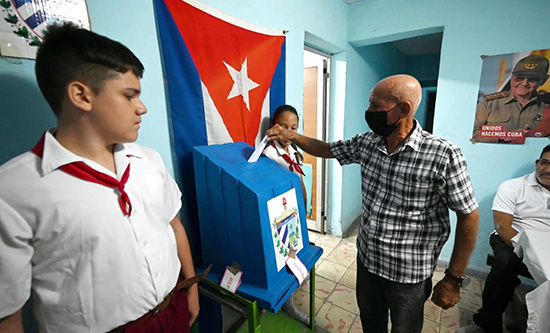
On 25 September the people of Cuba voted in the country’s new Family Code. This is a revolutionary law that recognises and legalises all expressions of families within Cuba. It also updates other aspects of Cuban society that campaigners from across the island thought were lacking in the original Family Code – introduced in 1975 – such as LGBT rights, adoption laws and redefined rights for seniors and children. Out of 6,251,786 eligible voters, 74% turned out to vote. Of these, a majority of 67% approved the Family Code. The new Family Code is among the most progressive in the world and reflects the consciousness of the Cuban people. It proves the ever-forward direction of Cuba’s Revolution in reflecting and defending true people’s democracy, even in the midst of the devastating US blockade.
Before the revolution, homosexuality was illegal and women faced a significantly inferior position in work and the domestic setting. The revolution sought an end to such oppression. After 1959, women took up leadership positions across the government and the Family Code of 1975, pioneered by leading revolutionary Vilma Espin, subsequently enshrined equality in the domestic setting. This code required ‘men to participate equally in domestic labour, guarantees equal rights to women and men in marriage and divorce, equal parental rights, and equal property and social rights for women in the home.’ This was ground-breaking for its time. Despite this, however, it became clear that an updated Family Code was required to reflect a changing society, one which would ensure greater LGBT rights, strengthen the rights of children, expand adoption rights, allow surrogacy births, give more protection for seniors and grandparents’ rights and ensure stronger protection against domestic violence.
The 2022 Family Code was decided by the people, for the people. Around six million Cubans participated in tens of thousands of meetings in workplaces, neighbourhoods and mass organisations to discuss and debate the first draft of the Code. Cuban nationals living outside of Cuba were also involved in this, discussing and debating with an online copy of the code opened to allow questions or additions to be sent through. In-person meetings were also held at Cuban embassies for further discussion. The critiques and suggestions that came out of these discussions were taken into consideration; many were accepted and helped to form the final draft, which was the 25th version. This was composed of 471 articles and 117 pages, and was released to Cubans on 25 September to allow the referendum voting process to begin.
The Cuban government approached the debates and referendum on the new Family Code as a ‘battle of ideas’. It knew that approval would require a process of education and political persuasion. Chauvinistic attitudes, called machismo in Cuba, have deep historical roots. They are the legacy of centuries of Spanish colonialism, Catholicism and the imposition of slavery, followed by the influence of US cultural standards imposed through imperialist domination. These views are reflected throughout much of Latin America. They are difficult prejudices to undo.
This, and the continued influence of the evangelical churches, has worked against the efforts by the government-funded National Centre for Sex Education (CENESEX), which under the leadership of Mariela Castro Espin has made great strides in promoting acceptance of sexual and gender diversity. The reactionary elements also affected the 2019 update to the Cuban constitution, the first draft of which proposed re-defining marriage as ‘between two persons’ rather than ‘between a man and a woman’. Evangelical churches responded with homophobic petitions and propaganda. Similar actions were taken by the churches in protest at the Family Code. The US government strengthens this opposition with funding going to right-wing Cubans in Miami, counter-revolutionaries and religious evangelicals in Cuba who seek to demonise the societal progress that the Family Code provides.
Therefore – to promote the values of inclusivity and respect for all – CENESEX and other state organisations undertook a programme of education via social messaging, popular mobilisations, cultural presentations and statements by cultural and political, youth and social leaders to promote the Code. Cuba’s president, Miguel Díaz-Canel, met with numerous communities, including leaders of the LGBT community, to ensure a representative, progressive and inclusive Family Code. When the first draft was released, it appeared in television announcements, on national talk shows, in newspapers and at community meetings.
Because of this work within communities, and in spite of the work by evangelical groups, the Family Code passed with a majority, continuing Cuba’s role as a pillar of equality and diversity throughout the world. In other parts of Latin America, homophobic attacks are still occurring at alarming rates even where gay marriage is legal. Between 2014-2015 at least 1,300 LGBT people were murdered in the region, with Colombia, Mexico and Honduras accounting for nearly 90% of all deaths, according to data collected by the Thomson Reuters Foundation. Same-sex marriage remains illegal or not recognised across most of Central America, parts of the Caribbean and several countries in South America, according to global LGBT rights tracker Equaldex.
Socialist Cuba will continue to be a society based on equality, one that has the well-being of its people at the forefront of all decisions. The new Family Code is only the most recent example of this, made possible solely by the fact that the Cuban state continues to adhere to the same socialist principles that drove the revolution to victory in 1959.
Ellie O’Hara




